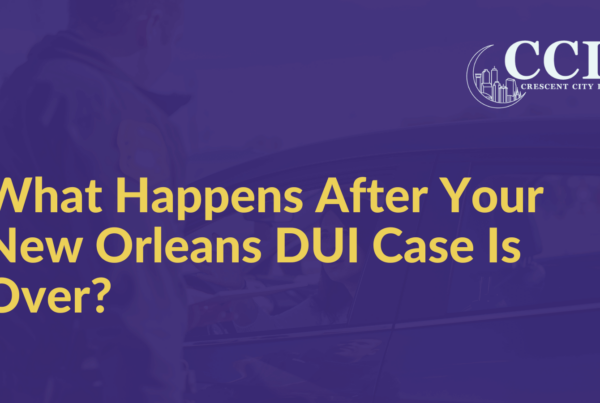As a medical professional in Louisiana, your career depends on trust, responsibility, and a commitment to public safety. A DUI (Driving Under the Influence) charge in Louisiana can jeopardize not only your reputation but also your ability to practice medicine.
Whether you are a doctor, nurse, or other licensed healthcare provider, it’s crucial to understand how a DUI might impact your medical license and what steps you can take to protect your future.
At Crescent City Law, we have proudly served Louisiana professionals for over a decade. Led by our dedicated advocate, John Radziewicz, and a team of experienced attorneys, we are committed to providing personalized legal guidance and representation for medical professionals facing DUI charges.
What Constitutes a DUI in Louisiana?
A DUI charge in Louisiana occurs when someone is pulled over for operating a vehicle with a blood alcohol concentration (BAC) of:
- 0.08% or higher for drivers over 21,
- 0.02% or higher for drivers under 21, or
- 0.04% or higher for commercial vehicle drivers
A first-time DUI is typically a misdemeanor, but subsequent offenses or aggravating factors—such as accidents or injuries—can lead to felony charges. Any DUI charge can have significant repercussions for medical professionals, particularly regarding your ability to maintain a valid medical license.
How Does a DUI Affect Medical Licenses in Louisiana?
A DUI charge can have serious implications for medical professionals, as licensing boards prioritize public safety and the integrity of the healthcare profession. Here’s how a DUI may impact your medical license:
1. Mandatory Reporting Requirements
Many medical professionals must report criminal charges, including DUIs, to their licensing board. The Louisiana State Board of Medical Examiners (LSBME) oversees medical professionals’ licensing and regulation. Failure to report a DUI—even if it doesn’t lead to a conviction—can result in disciplinary actions.
2. Licensing Board Investigations
Once a DUI is reported, the LSBME may conduct an investigation to assess whether the charge reflects impaired judgment or a pattern of behavior that endangers patient safety. The board typically considers:
- The circumstances surrounding your DUI
- Whether it is a first-time offense or part of a recurring issue
- Aggravating factors, such as high BAC levels, accidents, or injuries
While an investigation does not automatically mean license suspension, the outcome can significantly depend on how well you present your case.
3. Potential Disciplinary Actions
If the LSBME determines that your DUI compromises your ability to practice medicine safely, they may impose penalties, including:
- Probation: Restrictions on your practice or mandatory monitoring.
- Fines: Financial penalties that can add stress during an already difficult time.
- Mandatory Rehabilitation: Requirements to attend substance abuse treatment programs.
- License Suspension or Revocation: In severe cases, the LSBME may revoke your medical license, halting your ability to practice.
Consulting a criminal defense attorney in Louisiana, specifically practicing in DUI, can make a significant difference in understanding your options, protecting your license, and navigating licensing board proceedings effectively.
What Factors Influence the LSBME’s Decisions about DUIs?
Not all DUI charges result in the same consequences. Several factors influence how the LSBME handles your case, including:
- The Severity of the Charge: A misdemeanor DUI might result in lesser penalties compared to a felony DUI involving injuries or fatalities.
- Prior Disciplinary History: Previous DUIs, substance abuse concerns, or other violations may lead to harsher penalties.
- Voluntary Remediation: Enrolling in substance abuse programs or seeking counseling demonstrates accountability and a commitment to rehabilitation.
By presenting a well-prepared defense and showing dedication to high professional standards, you can often reduce the potential consequences on your medical license.
Personal and Professional Consequences Beyond Licensing
A DUI conviction can impact your life in more ways than one, including:
- Damage to Reputation: A DUI charge can spread quickly, affecting your relationships with peers, patients, and the community.
- Employment Challenges: Employers may impose penalties or terminate your position following a DUI conviction.
- Credentialing Issues: A DUI on your record could complicate license renewals or applications for hospital privileges.
Steps Medical Professionals Can Take After a DUI Charge
Being charged with a DUI can be a stressful and uncertain experience, especially for medical professionals. While every case is unique, there are general steps that individuals in this situation often consider to protect their personal and professional interests:
1. Understand Your Obligations
Medical professionals in Louisiana may have mandatory reporting requirements for criminal charges, including DUIs. Check the specific guidelines set by the Louisiana State Board of Medical Examiners (LSBME) or your licensing board to ensure compliance.
2. Document Key Details
Keeping detailed records of the incident can help you stay organized, including
- The timeline
- Interactions with law enforcement
- Any tests administered
This information may be useful during any subsequent proceedings or investigations.
3. Be Aware of the Investigation Process
Once a DUI is reported, licensing boards often initiate an investigation. Understanding how this process works, including the types of information the board may review—such as whether it’s a first offense or if there were aggravating factors—can help you prepare for what’s ahead.
Contact Our DUI Attorneys at Crescent City Law
A DUI charge poses serious challenges for medical professionals in Louisiana, from licensing board investigations to reputational damage. Proactively addressing the issue and partnering with a skilled attorney can help you get through these challenges and protect your career.
At Crescent City Law, we are committed to safeguarding your license and your future. Contact us today at 504-264-9492 to get the compassionate and strategic legal support you deserve.
4. Take Proactive Measures
Many professionals charged with DUI voluntarily address potential concerns. Examples of proactive measures include enrolling in alcohol education programs or seeking professional counseling. These steps may demonstrate a commitment to addressing any underlying issues.
5. Review Professional Standards
Reviewing the LSBME’s disciplinary guidelines and understanding how they handle DUI-related cases can provide insights into possible outcomes and help you prepare.
While the approach to handling a DUI charge varies by individual circumstances, knowing your rights and considering these steps may help medical professionals navigate the challenges and protect their careers.






